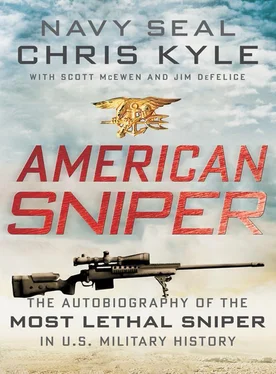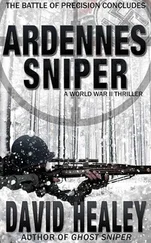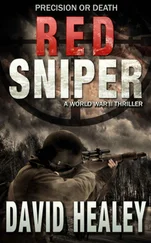The kid looked at me with a mixture of excitement and disbelief. He was a young Marine, eager but tempered by the fight we’d been waging the past week.
“Do you want to be a sniper?” I asked him. “Right now?”
“Hell yeah!” he said finally.
“Good,” I told him, handing over my Mk-11. “Give me your M-16. You take my sniper rifle. I’m going in the front door.”
And with that, I headed over to the squad we’d been working with and told them I was helping them hit the houses.
Over the past few days, the insurgents had stopped coming out to fight us. Our kill rate from the overwatches had declined. The bad guys were all staying inside, because they knew if they came outside, we were going to shoot them.
They didn’t give up. Instead, they would take their stands inside the houses, ambushing and battling the Marines in the small rooms and tiny hallways. I was seeing a lot of our guys being carried out and medevac’d.
I’d been turning the idea of going down on the street over in my head for a while, before finally deciding to go ahead with it. I picked out one of the privates who’d been helping the sniper team. He seemed like a good kid, with a lot of potential.
Part of the reason I went down on the streets was because I was bored. The bigger part was that I felt I could do a better job protecting the Marines if I was with them. They were going in the front door of these buildings and getting whacked. I’d watch as they went in, hear gunshots, and then the next thing I knew, they’d be hauling someone out in a stretcher because he just got shot up. It pissed me off.
I love the Marines, but the truth is these guys had never been taught to do room clearances like I had. It’s not a Marine specialty. They were all tough fighters, but they had a lot to learn about urban warfare. Much was simple stuff: how to hold your rifle as you come into a room so it’s hard for someone else to grab; where to move as you enter the room; how to fight 360 degrees in a city—things that SEALs learn so well we can do them in our sleep.
The squad didn’t have an officer; the highest-ranking NCO was a staff sergeant, an E6 in the Marine Corps. I was an E5, junior to him, but he didn’t have a problem letting me take control of the takedowns. We’d already been working together for a while, and I think I’d won a certain amount of respect. Plus, he didn’t want his guys getting shot up, either.
“Look, I’m a SEAL, you’re Marines,” I told the boys. “I’m no better than you are. The only difference between you and me is I’ve spent more time specializing and training in this than you did. Let me help you.”
We trained a little bit during the break. I gave some of my explosives to one of the squad members with experience in explosives. We did a little run-through on how to blow locks off. Until that point, they’d had such a small amount of explosives that they’d mostly been knocking the doors in, which, of course, took time and made them more vulnerable.
Break time over, we started going in.
Itook the lead.
Waiting outside the first house, I thought about the guys I saw being pulled out.
I did not want to be one of them.
I could be, though.
It was hard to get that idea out of my mind. I also knew that I would be in a shitload of trouble if I did get hurt—going down on the streets was not what I was supposed to be doing, at least from an official point of view. It was definitely right—what I felt I had to do—but it would severely piss the top brass off.
But that would be the least of my problems if I got shot, wouldn’t it?
“Let’s do it,” I said.
We blew the door open. I led the way, training and instincts taking over. I cleared the front room, stepped to the side, and started directing traffic. The pace was quick, automatic. Once things got started and I began to move into the house, something took over inside me. I didn’t worry about casualties anymore. I didn’t think about anything except the door, the house, the room—all of which was plenty enough.
Going into a house, you never knew what you were going to find. Even if you cleared the rooms on the first floor without any trouble, you couldn’t take the rest of the house for granted. Going up to the second floor, you might start to get a feeling that the rooms were empty or that you weren’t going to have any problems up there, but that was a dangerous feeling. You never really know what’s anywhere. Each room had to be cleared, and even then, you had to be on your guard. Plenty of times after we secured a house we took rounds and grenades from outside.
While many of the houses were small and cramped, we also made our way through a well-to-do area of the city as the battle progressed. Here the streets were paved, and the buildings looked like miniature palaces from the outside. But once you got past the façade and looked in the rooms, most were broken messes. Any Iraqi who had that much money had fled or been killed.
During our breaks, I would take the Marines out and go through some drills with them. While other units were taking their lunch, I was teaching them everything I’d learned about room clearance.
“Look, I don’t want to lose a guy!” I yelled at them. I wasn’t about to get an argument there. I ran them around, busting their asses while they were supposed to be resting. But that’s the thing with Marines—you beat them down and they come back for more.
We broke into one house with a large front room. We’d caught the inhabitants completely by surprise.
But I was surprised as well—as I burst in, I saw a whole bunch of guys standing there in desert camouflage—the old brown chocolate-chip stuff from Desert Storm, the First Gulf War. They were all wearing gear. They were all Caucasian, including one or two with blond hair, obviously not Iraqis or Arabs.
What the fuck?
We looked at each other. Something flicked in my brain, and I flicked the trigger on the M-16, mowing them down.
A half-second’s more hesitation, and I would have been the one bleeding out on the floor. They turned out to be Chechens, Muslims apparently recruited for a holy war against the West. (We found their passports after searching the house.)
Ihave no idea how many blocks, let alone how many houses, we took down. The Marines were following a carefully laid out plan—we had to be at a certain spot each lunchtime, then reach another objective by nightfall. The entire invasion force moved across the city in choreographed order, making sure there were no holes or weak spots the insurgents could use to get behind us and attack.
Every once in a while, we’d come across a building still occupied by families, but for the most part, the only people we were seeing were insurgents.
We would do a full search of each house. In this one house, we heard faint moans as we went down into the basement. There were two men hanging from chains on the wall. One was dead; the other barely there. Both had been severely tortured with electric shock and God knows what else. They were both Iraqi, apparently mentally retarded—the insurgents had wanted to make sure they wouldn’t talk to us, but decided to have a little fun with them first.
The second man died while our corpsman worked on him.
There was a black banner on the floor, the kind the fanatics liked to show on their videos when beheading Westerners. There were amputated limbs, and more blood than you can imagine.
It was a nasty-smelling place.
After a couple of days, one of the Marine snipers decided to come down with me, and both of us started leading the DAs.
Читать дальше












